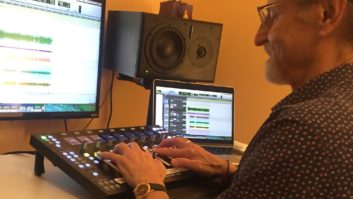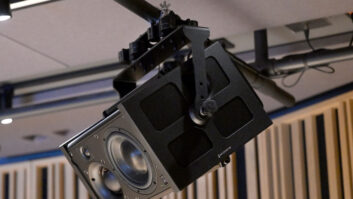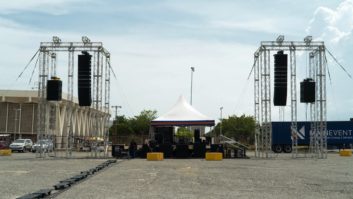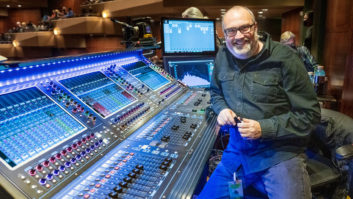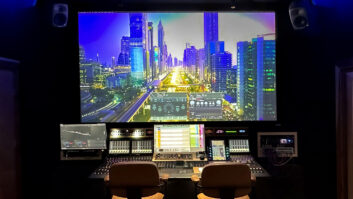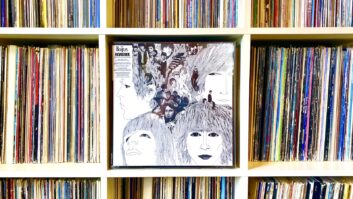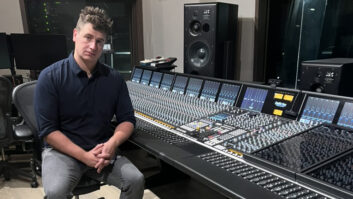
One certainly wouldn’t blame this year’s TEC Hall of Fame inductee— engineer and producer Eddie Kramer — if he wantedto slow down a bit. After all, he turned 61 this past April, and hedoesn’t have anything to prove to anyone. He’s done it all. In the’60s, he worked with The Beatles, the Rolling Stones, The Kinks,Traffic, Jimi Hendrix and Led Zeppelin, to name a few, and he was aprincipal engineer at Woodstock. In the ’70s, he was behind the boardfor albums by the likes of Derek & The Dominos, Eric Clapton, PeterFrampton, Humble Pie, Kiss, Mott the Hoople, NRBQ, Carly Simon and lotsmore Zep. He helped build Electric Lady Studios for Jimi Hendrix andthen ran it for several years after Hendrix’s death. In the ’80s, theindefatigable Kramer was still rockin’ in the studio with the likes ofAnthrax, Alcatrazz, Triumph, Ace Frehley and others. The ’90s brought him work with such varied acts as BrianMay, John McLaughlin, Buddy Guy and many others. In the new millennium,he’s still one busy dude: working on 5.1 mixes for various rock filmsand DVD projects; recording young groups in the studio (including asolo venture from Matchbox Twenty’s Kyle Cook and the maiden effort ofthe Norwegian hard rock band Hangface); organizing his incredible photoarchive into a lucrative business; lecturing far and wide about hisexperiences in the music business; and, of course, there’s all thatincredible Hendrix music. Kramer has been the de facto audio curator ofHendrix’s legacy, and the releases — both CDs and DVDs —show no signs of drying up anytime soon.

Kramer has been a loyal friend of Mix‘s for a long, longtime, always available to talk about music history and recording. Inrecent years, we’ve interviewed him for three “ClassicTracks” articles — Hendrix’s “All Along theWatchtower,” Led Zeppelin’s “Ramble On” and, mostrecently, Traffic’s “Dear Mr. Fantasy” — anddiscussed his techniques for surround mixing (Mix, March 2003).With his induction this month in the TEC Hall of Fame, however, wethought this might be a good time to offer a more general overview ofhis glorious career. We caught up with Kramer at his Putnam County,N.Y., home in late July. More than 30 years in America have chiseledaway at his South African/English accent — and also turned himinto a hardcore Yankees fan. (Please don’t hold that against him.)
He says one of his oldest memories is, at the age of three, stickinga metal rod into an electrical outlet and being knocked across the room(and then punished by his father), but we pick up his story a littlelater.
You were raised in South Africa and studied classical musicprimarily. Was any American rock ‘n’ roll getting through to SouthAfrica in the ’50s?
Plenty. We listened to Elvis and Chuck Berry. But the guy who reallyturned my head was Little Richard, since I was a pianist. Ithought he was amazing. I remember being in school and I could hear thesound in my head, and I remember trying to play all those parts. I gotthrown out of class one day for playing Little Richard! Actually, I wasattempting to play it, because even though I could play all ofthese classical pieces, it was not easy to play Little Richard; thoserepetitive 16th notes; that’s tough!

Was this your typical formal British-style school?
Oh God, yes sir! It was based on the English public-school model,actually. We had these hats called cheese-cutters, or straw boaters. Weplayed cricket in the summer and rugby in the winter. We wore blazersand caps. It was very strict. You got caned on the ass if youmisbehaved.
Worthy of a Roger Waters song!
Very much so. It was called SACHS, for South African College HighSchool, and it actually was a very good school; it did produce a numberof very talented individuals. But it also had a lot of very right-wingAfrikaner-style teachers who were pretty adamant. My father was veryleft-wing. He was South African and my mother was British.
Did you go to England much?
We kept going back. In ’49, we were there for a year. We came back in’56, and were there for a year. Then, after the Capetown riots [1960],my dad said, “We’re out of here!” I stayed on and finishedhigh school, but in my last two or three years of high school, Iactually attended the South African College of Music, so I was doingregular high school but also studying music at the university at thesame time. I don’t know how I managed to pull that off, but I did.
And you were studying classical music only?
Yes, I thought I was going to become a concert pianist. Then, duringmy last years of school, I became the chairman of the Music Society andI became very interested in jazz. I used to bring in jazz records bythe Modern Jazz Quartet and Oscar Peterson, Charlie Parker and thenclassical music, as well.
I arrived in England in December of 1960, not quite knowing what todo. I started off as a messenger boy for a fashion magazine, learningthe streets of London. Then got into an advertising agency as aninternal messenger boy, delivering stuff between floors. On the secondfloor of the building, there was a television production suite, whichhad two back-to-back projection booths, with two theaters — oneon each side — and they would show the dailies of the commercialsthat they’d shot there.
I became friendly with the guys in the projection room, and one day,one of them asked if I would help him wire something, so I helped himwire up these pieces of antique furniture, where we put amplifiers andtuners and a really nice turntable. I’d been interested in electricityand sound and all that for some time. Later, I was able to buy a taperecorder that ran at 15 and 7½, and I bought a couple ofmicrophones. I had a nice small grand piano in my place, and I’d invitefriends over to my living room to record. I remember wandering aroundthe room and since I only had the one mic at one point, when it came toa solo, I’d have to move the mic.
Anyway, after a while, I got kind of frustrated working at theagency and I figured, “Music? Electronics?” A light bulbwent off, and that’s when I decided to try being an engineer at a soundstudio. So I opened up this book that listed all of the recording andfilm studios [in London], closed my eyes and I stabbed at it with a pensix times. I wrote off six letters, and one of them came back and askedme to come in for an interview. That was Advision, and I got a job asan assistant; a tea boy, as they were called in England. I learned alot there: how to work a projector, record mono, some mastering. Andmeanwhile, I was still experimenting with my friends — nowbringing them into a proper studio. The studio had these great bigPainton faders. I’d have to take them apart, clean them every week andput the bloody things back together. We also had a very interestingtape machine called a Magnetophon. It was a version of one of theGerman wartime machines. It was a nasty thing because it was all DCvoltage, and when you’d push the Stop button, sparks would fly out andyou’d get a shock. You had to figure out how to push it fast and getyour finger away, which ended up being great training for punch-inslater. [Laughs]
Obviously, there was a point when you decided that being aconcert pianist wasn’t for you.
I gave up that idea in late high school. The idea of practicingendlessly was just too much. But I had a damn good education, I mustsay. And a very wide-ranging taste in music: everything from jazz toblues to rock ‘n’ roll to R&B. Popular music. Bach, Brahms,Beethoven. Bartók. Shostakovich. I was interested in all forms ofmusic.
There aren’t that many people who get that kind of educationanymore.
That’s true, and it’s unfortunate. Even the guys up at Berklee, whereI do some teaching, are so specialized now.
You moved from Advision to Pye, which was more of amusic-oriented studio.
Yes it was. My first mentor was a guy named Bob Auger. Bob wasbuilding Pye Studios, and it was very unusual in the sense that it wasbasically an American-style studio. He had a dear friend in New Yorknamed Bob Fine, of Fine Recording Studios, and Bob Auger wastremendously influenced by him. So when Bob decided to build Pye, hemade it like an American studio with Pultecs, great mics and all. Infact, he went so far as to have an entire room, with big transformers,wired for 110, which was highly unusual. He thought the machinesperformed better at 110. We had a Neumann mobile board that was ploppeddown in the Studio A control room; the preamps were down on the floor,and my job was to run down and move the attenuator 10 dB, 20 dB. It wasall Ampex 300 3-track. We recorded Sammy Davis Jr. in an amazingfirst-time midnight session. We’d go down [to Walthamstow Town Hall]and make classical recordings with a portable Ampex 3-track and threeNeumann U47s. That was it; you had to figure out how to make it soundgood. That influenced me tremendously; in fact, it influenced how Irecord drums. We did some great sessions at Pye: The Kinks, PetulaClark, all sorts of pop and rock things.
You were still an assistant.
Yes, it took me awhile to become an engineer. It took me from ’62 toabout ’66. It was when I went to Olympic that I became an engineer fulltime.
How did you end up there? I know you’d worked at your own studio,and at Regent Sound after Pye.
Well, I just kept hearing about Olympic through the grapevine, andthen I kept pestering [Olympic technical director] Keith Grant, who wasalso a student of Bob Auger’s, so there was a heritage there. Keith wasan amazing engineer. He taught me how to do so many things. One of thefamous sessions we did together was The Beatles’ “Baby You’re aRich Man,” and I also did “All You Need Is Love.” Itwas a great training ground and the studio was just a magical place. Itwas remarkable in the sense that it was the up-and-coming independentstudio.
“Baby You’re a Rich Man” was done atOlympic?
Yes. Of course, The Beatles almost always worked at EMI, but they cameto Olympic for the very simple reason that they couldn’t get into EMIat the time and they wanted to record. We were the competition and wegot the gig. “Baby You’re a Rich Man” was recorded,overdubbed and mixed all in one night.
I’d been recording Jimi and the Stones and that was really cool, butThe Beatles coming in was a very big deal and I was nervous. You know,for a while, I’d been taking pictures of all the artists I was workingwith, but this was the one time I chickened out. I didn’t think it wasappropriate at the time. It would have been nice to have some photos ofthat, of course. [Laughs]
Speaking of the Stones, you’ve said that their producer, JimmyMiller, was another teacher and mentor.
When I think back, the three people that influenced me the most wereBob Auger and Keith Grant as engineers, but as a producer, Jimmy Millerwas it; he was the king. He had such a wonderful ability to sense wherethe band was at, get into their heads, get their confidence, and thenfire them up in the studio and get great performances from them. He wasable to put such a spark into the cutting of the tracks. I startedworking with him on Traffic’s Mr. Fantasy and then moved ontothe Stones’ Beggar’s Banquet. He was an extremely impressiveindividual. He was able to grab the artist by the balls and bring themalong with him. He could help them with song structures and be veryinvolved on that level, or be a fly on the wall when he needed tobe.
So many of the big albums from that era— Sgt.Pepper,the first Traffic album, the Stones’TheirSatanic Majesties Request —were notable for the amount ofmusical and sonic experimentation on them. No idea was too weird, itseemed.
We were willing to take chances and encouraged to take chances.That was a part of the spirit of those times. It didn’t matter,somehow, whether this player or that player could really play some ofthese instruments. No one was thinking, “Well, they’re not goingto play a track with a sitar on the radio!” If it sounded cooland it was going to add to the track, we’d try it, and sometimes we’duse it.
When did you first encounter Hendrix?
Well, of course I knew about him already. Jimi had come to London fromAmerica [in the fall of ’66] and almost immediately, he had a hit with“Hey Joe.” The word was out that there was this amazingAmerican guitar player. Anyway, I remember one day, the studio manager[at Olympic] — this lovely, very prim and proper English lady— saying to me, “Oh Eddie, there’s this American chappiewith big hair named Hendrix coming in. You do all the weird stuff, sowhy don’t you do this session?” At that time at Olympic, I wasdoing avant-garde jazz, experimenting, trying all of these differentthings. So I got the Hendrix gig, and, obviously it was a veryfortuitous experience. [Laughs]
They’d already recorded “Hey Joe” and some B-sides— maybe three or four songs — so what we did was continuedwith that work on what became the first album [Are YouExperienced?]. We re-cut some guitars and then started new tracks.It was a wonderful time. Imagine the excitement of being in the studiowith Jimi — he was so incredible! We hit it off immediately. He’dbe in there cranking up the guitar and I’d hear these amazing sounds,and I’d think, “Okay, let’s see what happens to that sound if Itweak it like this.” Then he’d come in the control room, listenand say, “Whoa, that’s cool, man! What happens if you do that andthen I turn this knob?” So he’d try this and try that. Hewas excited about what I was doing and I would get excited about whathe was doing; it was a great feeling of camaraderie, because every timewe rolled tape, we were doing something new. Chas Chandler [Hendrix’smanager and producer] said it so well: “The rules were, thereare no rules.” I have to quote him, because without Chas,we wouldn’t be talking right now! [Laughs] Chas was “theguv’nor.” He really helped Jimi tremendously on those first tworecords.
Was what you did with Hendrix as an engineer that different thanwhat you did with everyone else?
I was much more inclined to take chances. His playing was so differentand unusual and had so much depth that it encouraged me to see whatinteresting things I could do with it: “Let’s see how far out wecan take this.” We experimented with phasing and EQ andcompression and reverb, and he was up for it all. He loved thatphasing; wanted it on everything. [Laughs]
DidSgt. Pepperaffect you the way it affected somany other engineers?
I’m not sure it affected me other than it was obviously a brilliantrecord. I was so involved with the next session that I didn’t reallyhave time to digest it from a technical standpoint, or think too muchabout how it was done.
One thing that did influence a lot of us in England, though,was the sound of the bass on so many American records in the mid- andlate ’60s. We would study records by Dylan and some of the R&B andpop artists and we’d hear this bass and wonder, “Damn, how thehell did they get that sound?” I know this for a fact because Icame to America in 1968 and figured out how to do it.
And the answer was….?
It was Pultecs and LA-2As and all of the American preamps thatengendered that sound. Of course, a lot of it was the playing, too.
It’s funny, because while I was trying to figure that out, all ofthe American engineers would ask me, “How did you get that soundon Hendrix?” So there was a great cross-pollenization of ideas.Plus, you had the great English bands coming over to the States beinginfluenced by the Americans, and vice versa. I think at the time, wehad the better consoles in England: the Helios and such. But we didn’thave 8-track yet, and we were very jealous of the Americans for that.When I came to the States in April of 1968, I jumped from 4-track to12-track when I went to work at the Record Plant, and that was quite achallenge.
Once you were here in the States, you still worked with Hendrixon Electric Ladyland, and then you also worked on Led Zeppelin’ssecond album. What was it like working with Zeppelin?
I very much enjoyed working with the Zeps. Obviously, they were agreat, great band, and by the time I recorded them, they were alreadyquite a success in both the U.S. and in Europe. I mixed that secondalbum in just two days at A&R Studios on a small, 8-channel boardwith two pan pots! With Zeppelin, you always knew who was the boss:Jimmy Page. He always had very specific ideas of what it should soundlike, what the solos should be, how the vocal fits in with the overallsound. He was very, very much in charge at all times, and verytalented.
You got to work with the best rock guitarists of that generation:Clapton, Hendrix, Page. Then later, you worked with bands who had beeninfluenced by those players and were clearly more derivative than theywere original, such as Kiss. Was that at all strange?
Not at all. I really liked working with Kiss. You have to look at Kissin a different light, because they are such a different animal. Gene[Simmons] had this concept about making a rock ‘n’ roll band withmakeup and each member having his own identity. And they played thishard rock that was pretty good, but with them, it was the whole thing:the music and the image. Ace [Frehley] was certainly influenced byClapton and Henrdrix and Page and all of the great guitar players, andyou can hear it, but at the same time, he combined those influences insome interesting ways. I think he’s a greatly underrated guitar player.Also, I liked their rawness and directness. Kiss is an anomaly. They’rereally an entertainment band, like a traveling rock ‘n’ roll circus.It’s theater, kabuki, rock ‘n’ roll on steroids. It’s made for fun.
I remember going in the studio and cutting their demo: a 4-track atElectric Lady. I still have the original quarter-inch. They went offand did their touring and got their record deal. I didn’t actually doan album with them until the live album [Kiss Alive]. When I gotthe phone call from Neil Bogart, who was the head of Casablanca, askingif I wanted to do the live record with Kiss, I had a tape on my deskfrom Tom Scholz and Boston and I listened to it, and I thought it wastremendous. I called Tom back and I said, “Tom, this record isgreat, man, put it out the way it is. I can’t add anything toit.” So I did the Kiss record. I wanted the challenge of workingwith a band that was leaping around, bombs exploding. How do you makethat sound good? They’re out of tune, they’re out of time…
It’s interesting that you were doing that at the same time youwere working on Physical Graffiti with Led Zeppelin, which is areally bold and sophisticated album through and through.
That’s true. I was very fortunate. I went to England and recorded awhole bunch of tracks for them using the Rolling Stones mobile. Again,Jimmy knew what he wanted. I will say this, though: The unsung hero ofthat band was John Paul Jones. He was very, very bright and knew a lotabout arranging and had many good ideas.
Led Zeppelin was one of those groups that went through thatinteresting progression of becoming really, really huge and having ascene around them that got progressively weirder and druggier. As anengineer, were you affected by those kinds of changes?
Sure, you couldn’t help it. With Zeppelin, it became a battle, becausethey started to come into studio with such an attitude. At one point,they came into Electric Lady to mix one of their albums, the one with“Stairway to Heaven.” We started and then one night, theband ordered some Indian food and a whole bunch of it spilled on thefloor and I asked the roadies to please clean it up. The studio wasbrand-new and I had a lot of pride in it. And suddenly, they’reyelling, “You don’t tell our roadies what to do!” And theypulled out; they left, and I didn’t speak to them for about a year!Then later, they called back and asked me to record them again as ifnothing had happened. [Laughs]
How did you become Mr. Live Recording? Was it recordingWoodstock?
Pretty much. After that, it was, “Let’s get that guyKramer.” I did Derek & The Dominos, Peter Frampton, HumblePie.
What’s the key to recording live? You’d never been afront-of-house engineer, right?
No, I hated that. I would never do that. It’s a question of keepingthe band happy and comfortable. The key is their performance. Really,it’s a question of capturing that performance and not getting in theway at all. Even if I have to put a mic in a place where I normallywouldn’t, so be it, if it makes the band more comfortable. The mostimportant thing is to get the performance.
When you made Frampton Comes Alive, did you have any sensethat it would be so popular?
How could one? It was the same thing with Kiss: “Ah, we’ve got agood record here. It would be nice if it sold a couple of hundredthousand.” And it took off like a bloody rocket, sold 3 or 4million. With Peter, we knew he had a fan base, but we couldn’t havepossibly predicted it would sell 14 million records. Who the hellknew?
When you work with young engineers, as you invariably must, dothey all defer to you because of your track record? I mean, you’reEddie Kramer!
[Laughs] Well, I suppose some of them are a bit intimidated at first,but you know, I like working with young engineers because they have adifferent perspective and they have some cool ideas of their own. It’snot like I know everything. I’m still learning. I’m open to newideas.
That said, there is a certain way I like to record: I have my ownmethods of doing drum and guitars and my EQ’ing. I suppose I amslightly old-fashioned — I hate to use that term — in thesense that my method of recording is getting sounds now. Ibelieve in committing to the bloody thing. Get the compressionright; get it sounding cool now. Otherwise, you’re justprolonging the agony. Later on, you’re going to have to twist knobs forthree hours, trying to figure out how the hell you want to make theguitar sound. I like to get the sound then and there, and everybody’shappy. Then, when I get to mixing, it’s a much easier job.
As one who was so good at recording bands live — both inthe studio and onstage — did you ever go through a phase in the’70s or ’80s when you would record every element separately one at atime, agonizing over sonics? Spend five hours getting a snare drumsound?
I never did that. I made a very strict rule: I walk in thestudio and if in 20 minutes I don’t have a drum sound, I go home.
I tell [students] that when I lecture at Full Sail or Berklee or theUniversity of Miami, and they’re always shocked because they thinkyou’re supposed to agonize over it, like you say. But I’m serious. Thisis not f***ing rocket science. Yes, there is a bit of science to it.There are some technical things you have to know. But, basically, it’sabout the song, the song, the song, the song. And then theperformance. And then the sound. Of course, your technique has to be asgood as the song and the performance. All of those elements have tocome together. But don’t belabor it!
One of the unfortunate things about today’s music is that everyonehas become so perfection-oriented. I have to blame that to a certainextent on Pro Tools and the ability to make things perfect. Don’t getme wrong: Pro Tools is a wonderful device. It’s a great editingtool. But I know from bitter experience that you give certain peoplePro Tools and they’ll sit there for months dicking around tryingto make it perfect. The whole idea of rock ‘n’ roll music, to me, isgoing in there and playing like a band and trying to get out someemotion. Not making the vocals perfect and the guitar partsperfect. Rock ‘n’ roll should have some hair on it, if you know what Imean. Now, even hard-rock bands are working that way: They’ll play asmall section and then they’ll time-stretch it and fart around with it,fix notes and all this. C’mon! Let’s play this stuff for real! Itreally pisses me off.
I use Pro Tools myself. It used to be that I’d record on analog anddump it into Pro Tools and work with it. Now with HD, you can recorddirectly to Pro Tools and it sounds pretty good. It’s still not as goodas analog. If you want that crunch in rock ‘n’ roll, you still wantsome analog equipment in the chain. I think the two worlds can coexistvery happily together. But don’t abuse the digital world or become aslave to those computers! It drives me nuts.
Where do you like to work?
In L.A., I work at NRG a lot. It’s a nice amalgam of high-tech 2003digital recording and vintage analog. In New York, there are a bunch ofstudios I use. The obvious choices are the Hit Factory and Right Track,and Avatar’s very nice, too. But there’s a very nice studio calledClinton that I really like a lot. I used to go to Electric Lady, ofcourse, but haven’t been back there for quite a while.
You worked with a third generation of rockers in the ’80s, bandslike Anthrax. You did all these hardcore heavy-metal bands.
I sure did. [Laughs]
How’s your hearing, Eddie?
Whaaaat? [Laughs] Seriously, I think the idea is to minimize yourhearing loss by using small speakers where possible. Initially, whenI’m tracking, I’ll use the big speakers to make sure that therelationship between the bass drum and the bass guitar is what I thinkit should be, even though the big speakers can be horrible; it seemslike in a lot of studios they are, which is unfortunate. I likeDynaudio speakers. I can use Genelecs; I think they’re okay. Just keepthe volume down. You don’t have to crank it all the time. If you haveit up loud for an hour, you’re going to have hearing loss, period. Sokeep the bloody volume down. I think you get better perspective,too.
Has the basic personality of bands changed during theyears?
Nah! [Laughs] It’s usually the leader of the band that has the bestideas and is the smartest…
And then the others are resentful of him…
Yeah, absolutely. There’s always the next guy who maybe thinks he’s asgood, and that’s where the battles start. But you know what? If thebattle is over creativity, hopefully what comes out is a fine product.Because I think if there’s no resistance and there’s no spark, what thehell do you have? A piece of wet, soggy paper. When you think aboutRobert and Jimmy of Led Zeppelin, they were knocking heads all thetime. Same with John and Paul in The Beatles.
Well, there was always a tremendous undercurrent of mutualrespect in those cases.
Undoubtedly. The point is, without that spark, that creative tension,you don’t have as much.
What have you done the past few years that excites you, otherthan the reissues?
What I love right now is the fact that I’ve been able to go in and do5.1 surround mixes. What a marvelous thing 5.1 is, particularly for me,because I’m a big fan of movies and I love the fact that I can get inthere with a live recording with a good picture and really work withthe sound. It’s a great challenge and the results can be amazing. I’vejust finished this film, The Festival Express [a documentaryabout a 1970 trans-Canada train trip by Janis Joplin, The Band, theGrateful Dead and others] and it was so much fun. The tapes were veryold; they sat untouched in a vault in Canada for 25 years. I didMonterey Pop and that was quite a challenge. I just finished doing a5.1 of Jimi Plays Berkeley and it’s stunning! The “JohnnyB. Goode” is just hair-raising!
How much Hendrix stuff is left at this point?
We still have enough material in the library to come out withsomething completely new for many years to come. That’s not includingfilm things we’re working on. It’s a massive library and it’swell-taken care of.
A lot of it is really good, and there are some things that aren’tthat great, of course. We grade it by the quality of the recording andthe performance. There are some things that only the really hardcorefans will like; things that sonically might not be that great, but aregreat performances. So I’ll do the best I can with it, but the buyerhas to know that there are limitations. We have some audience tapeslike that and also some less-than-great 2-tracks from the board. Butthe idea is to make it available to the fans on Dagger label at areduced price. It’s not junk; it’s EQ’d and mastered properly.
Do you have to bake the tapes?
No. Most of the stuff was pre-’70s, which is when the tapes startedgoing to hell. The saddest thing right now is that BASF/Emtec is nolonger; that really hurts because it’s been my favorite tape forever.All of the early tapes I did with Jimi in ’67 and part of ’68 were onBASF LR56, that horrible, sickly green tape that sounded so great! Tothis day, I’ve played tapes from those sessions and they trackperfectly; no shedding. They sound absolutely wonderful, and I’ve neverhad to bake them.
It’s still a thrill for me to go back to the master tapes and pullup the faders and listen to Jimi talking to me, or Chas sayingsomething, or Jimi making jokes about Mitch and Noel. And, of course,much of the music is just wonderful. I never get tired of working onHendrix.

Want more Eddie Kramer? Check out this interview from the Mix archives, August1998.
Blair Jackson is Mix’s senior editor.

